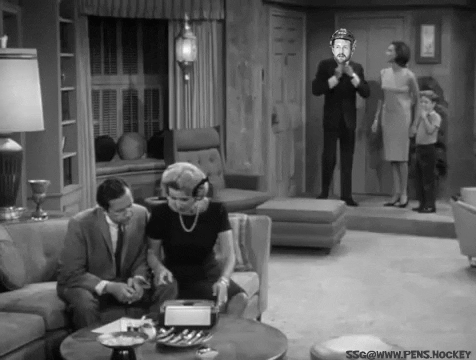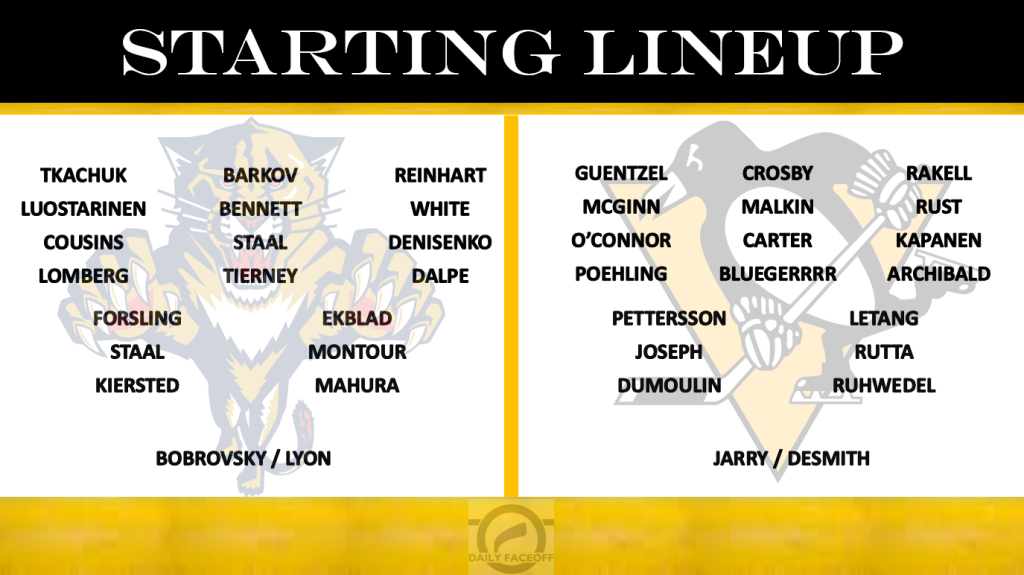

With the winter solstice a week away, the very-hot Pittsburgh Penguins head out on the road for a couple of games south of the Mason-Dixon line, starting tonight with a contest against the Florida Panthers before perhaps a more crucial matchup on Sunday with their Metropolitan Division foes, the Carolina Hurricanes. Only one other team in the entire League has a better record than the Penguins in their last ten games, and two since Pittsburgh started turning things around on November 9.

A key aspect of the Penguins’ success since then has been the performance of the defense. Despite losing Kris Letang for a couple of games(!) due to his stroke(!!), Pittsburgh has allowed the third-fewest goals against per game, a rate that matches nicely with the other two teams that have played better than they have (Boston: first; Toronto: second). In that timeframe, each team’s defensive workload has differed greatly: Boston simply hasn’t been allowing many shot attempts (3rd-fewest) or shots-on-goal (t-second-fewest); Toronto faces a lot of shot attempts (twelfth-most) but a lot of those don’t get through on goal (nineteenth-most shots-on-goal against); but Pittsburgh is in the top ten in shot attempts against and shots-on-goal (seventh-most on both). Ultimately, these three teams are the top three in the League in fewest goals allowed per game since November 9 (Boston: first; Toronto: second; Pittsburgh: third), and perhaps not coincidentally they are also the top three teams in save percentage (flip Toronto and Boston).

So then it will be interesting to see if and how things change with Jeff Petry leaving the lineup long-term with an injury to his arm. In his first season with Pittsburgh, Petry has been middle-of-the-road across the board in terms of the relevant metrics as far as the entire season goes, but since November 9 he has really hit his stride. In that timeframe, relative to the rest of the team, Petry has allowed the fewest unblocked shots per 60 minutes, the fewest shots-on-goal against per 60 minutes (by a large margin on both), and is second to Chad Ruhwedel in goals-against per 60 minutes. Of course, the main difference between Petry and the likes of Ruhwedel or Pierre-Olivier Joseph, both of whom have also done well defensively of late, is that Petry has been playing almost 23 minutes per game while the other two are at 15 (Joseph) and ~14 (Ruhwedel), so Petry’s work has been critical, to the point where he’s amongst some of the best defensemen in the League with his play of late.

After winning the Presidents’ Trophy last season with the League’s best record, the Florida Panthers are not looking as certain to even make the playoffs, as they are currently tied with the Detroit Red Wings for fourth in the Atlantic Division (technically fifth on points percentage). The playoff race in the Atlantic is shaping up to be quite interesting: Boston and Toronto have opened up a 10 and 7 point gap, respectively, on a third place Tampa Bay Lightning team that is not to be trusted in the regular season. The Bolts are then five points ahead of the Red Wings and Panthers, then on the other side of Detroit and Florida are Montreal (2 points behind), Buffalo (4 points behind), and Ottawa (6 points behind). Since November 9, the five teams in the bottom of the division have been keeping pace with each other for the most part, so no one has really fallen out of contention like some teams have in other divisions. The way things are shaping up, the Atlantic Division may only get three playoff spots this spring (Detroit and Florida are two points behind the Washington Capitals, who are in sixth place in the Metro Division), so the Panthers and their Atlantic Division peers have a lot of work to do if they want to squeak their way into the playoffs.

Florida’s main issue has been health related. Aaron Ekblad missed nearly four weeks, Aleksander Barkov missed seven games, and Anthony Duclair has yet to play after scoring 58 points in 74 games last season. They are also currently without Radko Gudas and Patric Hornqvist (who hasn’t been nearly the contributor he once was). As we are all well aware, health problems can sink a season, and for many of the last several seasons Florida has also had seasons derailed by health issues. Last season they were in the middle of the League in terms of man-games lost, and not having so many injuries likely played a substantial role in their regular season success. I would believe that Florida, more so than the rest of their peers in the bottom five of the division, will have what it takes to get into the playoffs. Whereas the other four teams in the bottom five of the division are on the younger side and still have time to improve, Florida is in the middle-of-the-League in terms of player age and their window is clearly open right now.

